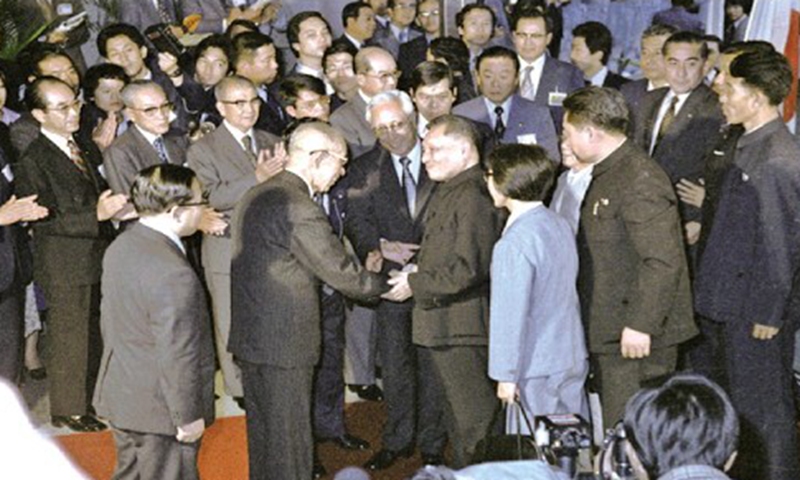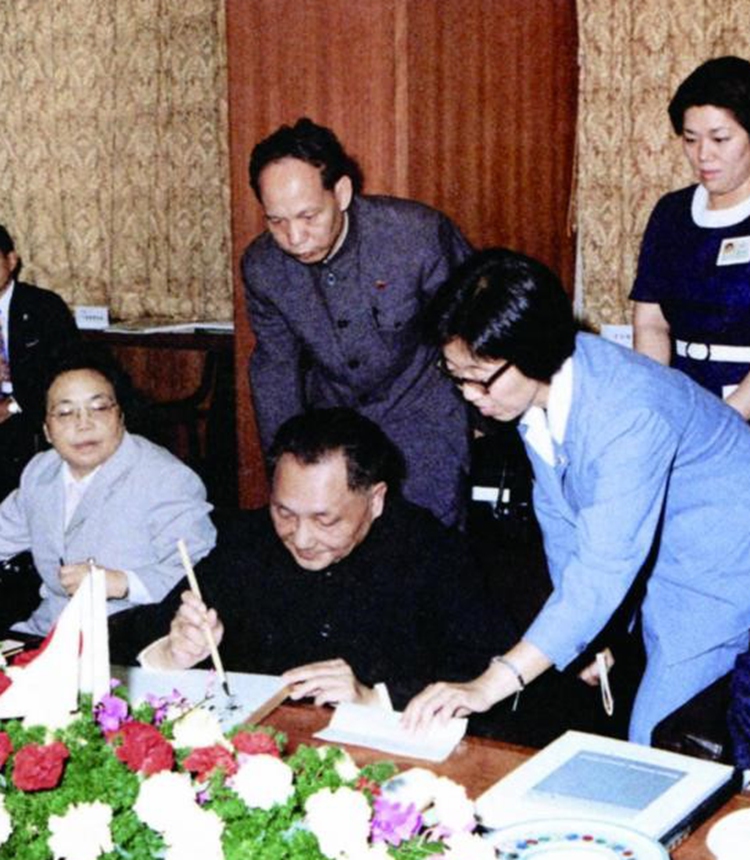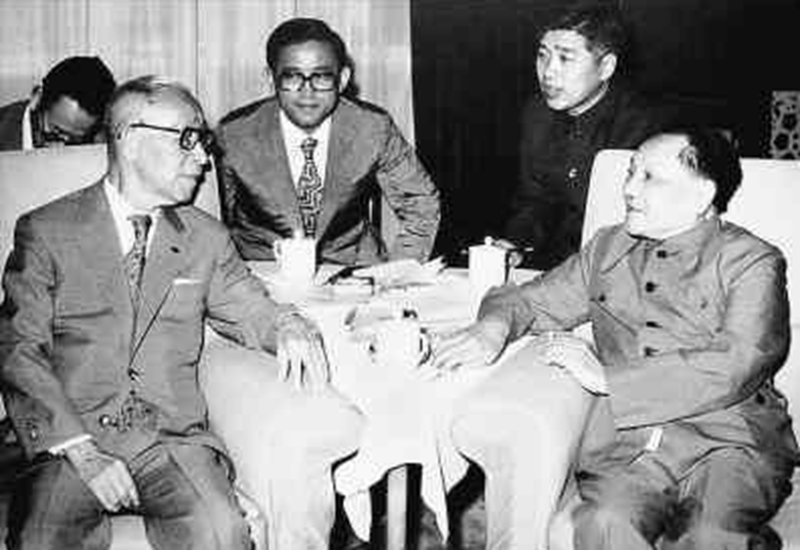




- BRNN
- BRI News
- BRNN News
- Database
Official Documents Polices and Regulations
Inter-government Documents International Cooperation BRI Countries
Business Guide Economic Data BRI Data
Trade
Investment Projects Latest projects
Cases - Content Pool
Over the course of more than four decades of reform and opening-up, China has shown to the world its sincerity, modesty and readiness for cooperation. People in China have never forgotten the foreign friends who contributed their share to China's reform and opening-up endeavor. At the conference marking the 40th anniversary of the launch of reform and opening-up, 10 foreigners were awarded the China Reform Friendship Medal. One of the honorees, Konosuke Matsushita, is the founder of Matsushita Electric (later renamed as Panasonic); he is also known as the "god of management" in Japan. A witness and supporter of China's reform and opening-up, Matsushita had a gentlemen's agreement with Deng Xiaoping, the "chief architect" of reform and opening-up, and their story is still widely told today.
In 1978, despite China's aspiration to achieve Four Modernizations to modernize its agriculture, industry, defense, and science and technology the country was short of necessary funding, technology know-how and management expertise. In October that year, Deng Xiaoping was invited to pay an official goodwill visit to Japan. He spent a lot of time visiting Japan's modern enterprises and high-tech facilities, and met with a large number of Japanese business leaders, senior economists, technicians and managers. "I have come to Japan to learn from the Japanese people," said Deng earnestly at a press conference. "And we believe such an attitude, together with China's policies and guidelines, will bring hope to China." Deng's frank, down-to-earth manner, his open-mindedness and confidence impressed his Japanese hosts.
Matsushita Electric was an important stop on Deng's visit. It was there that the bond of friendship between Deng and Matsushita started. It was raining on the day of Deng's visit to the factory. Matsushita, already in his 80s and retired, waited at the front gate to greet Deng and the Chinese delegation. He accompanied the party throughout the visit. According the recollection of Deng's entourage, Deng walked very slowly during the tour; he observed the production process very carefully, stopping every now and then to ask questions. When the staff showed him the workings of a microwave oven, a high-tech product back then, he expressed great interest. He picked up a microwaved dumpling, had a bite, and commented, "It tastes good; the oven is very nice." Then and there, Matsushita saw in Deng an easy-going leader, a pragmatist who was prepared to try new things, and he had even greater respect for the Chinese communist leader.

Deng Xiaoping shakes hands with Konosuke Matsushita, founder of Matsushita Electric, during Deng’s visit to the company.
Deng was straightforward in the following talks. "China will embark on a modernization drive. While mainly relying on ourselves, China is considering drawing on foreign technology and investment." He then asked Matsushita, "Can you give a little help to our modernization efforts?" Matsushita, moved by the Chinese leader's sincerity and determination, replied in his Kansai accent, "I will do everything to help." A gentlemen's agreement was thus reached. Delighted at hearing these words, Deng wrote on the factory's guest book "China-Japan friendship boasts a bright future."

Deng inscribes the factory’s guest book “China-Japan friendship boasts a bright future.”
The ocean is vast because it admits all rivers. China, a nation that values modesty, believes there is always someone to learn from, and welcomes the world's brightest minds.
In June 1979, Matsushita came to China upon invitation, making him the first renowned foreign entrepreneur to visit New China. Deng had a cordial meeting with him. Talking about the development of the electronics industry, Deng said, "What is modernization? I think it means electronic industrialization. Without it, there is no modernization to speak of. China is a big country with a large population. It is yet to live up to its due international responsibilities. We have to work hard ourselves, but we also need help from others. We need to bring in a lot of technologies to help us improve, otherwise we will be lagging behind others in modernization." Matsushita admired Deng's strong sense of responsibility, foresight and international vision. He pledged right away to help modernize China's electronics industry, and came up with a grand plan: Matsushita Electric would bring together Japanese electrical and electronic enterprises to jointly support China's industrial reform. Deng heartily approved of this plan. With the gentlemen's agreement set in motion, China's electronics industry was about to move onto a new level.

Deng meets with Matsushita on the latter’s first visit to China.
A promise is a promise. When Matsushita returned to Japan, he reached out to other electronics heavyweights and did media interviews to explain China's reform and opening-up policies. He wrote articles on how he was moved by Chinese leaders' enthusiasm for modernization, their modest and down-to-earth style, as well as their willingness to be flexible on specific issues. However, Japan was just a few years into diplomatic relations with China, and its electronics industry had little knowledge about China at that time. This, coupled with fierce competition amongst Japanese electronics companies themselves, made it difficult to coordinate any collective effort. Matsushita's proposal did not garner much support.
In 1980, when Matsushita visited China again, he apologized to Deng in person. "It's OK that the plan didn't work out. The important thing is our friendship and our willingness to work together. China's opening-up policy will remain unchanged," Deng assured him. Impressed by Deng's farsightedness, resolve and commitment to China-Japan friendship, Matsushita said that his company alone would engage in cooperation with China, and will lead by example by setting up a joint venture.
After overcoming many difficulties and with the efforts of various parties, the gentlemen's agreement finally came to fruition. In 1987, the Beijing Matsushita Color CRT Co., Ltd was established, the largest Sino-Japanese joint venture at that time. The company generated profits in its first year of operation, which caused a sensation in Japan's business community. Coming to appreciate China's open policies and huge market, more Japanese businesses followed suit. As reform and opening-up deepened, Matsushita Electric's business in China expanded in tandem with China's economic growth, becoming a household name and trusted foreign brand in China.
Now, some 40 years on, this gentlemen's agreement between Deng Xiaoping and Konosuke Matsushita still rings in our mind. It is an epitome of China-Japan friendship, an important boost to China's reform and opening-up, and a testimony to the modesty, pragmatism, and trailblazing spirit of the Chinese Communists. Today, Panasonic, who still enjoys good cooperation with China, continues to write new chapters of China-Japan friendship. Going forward, China will open up wider to the world, build international platforms, invite more foreign friends, and reach more gentlemen's agreements.

Tel:86-10-65368972, 86-10-65369967